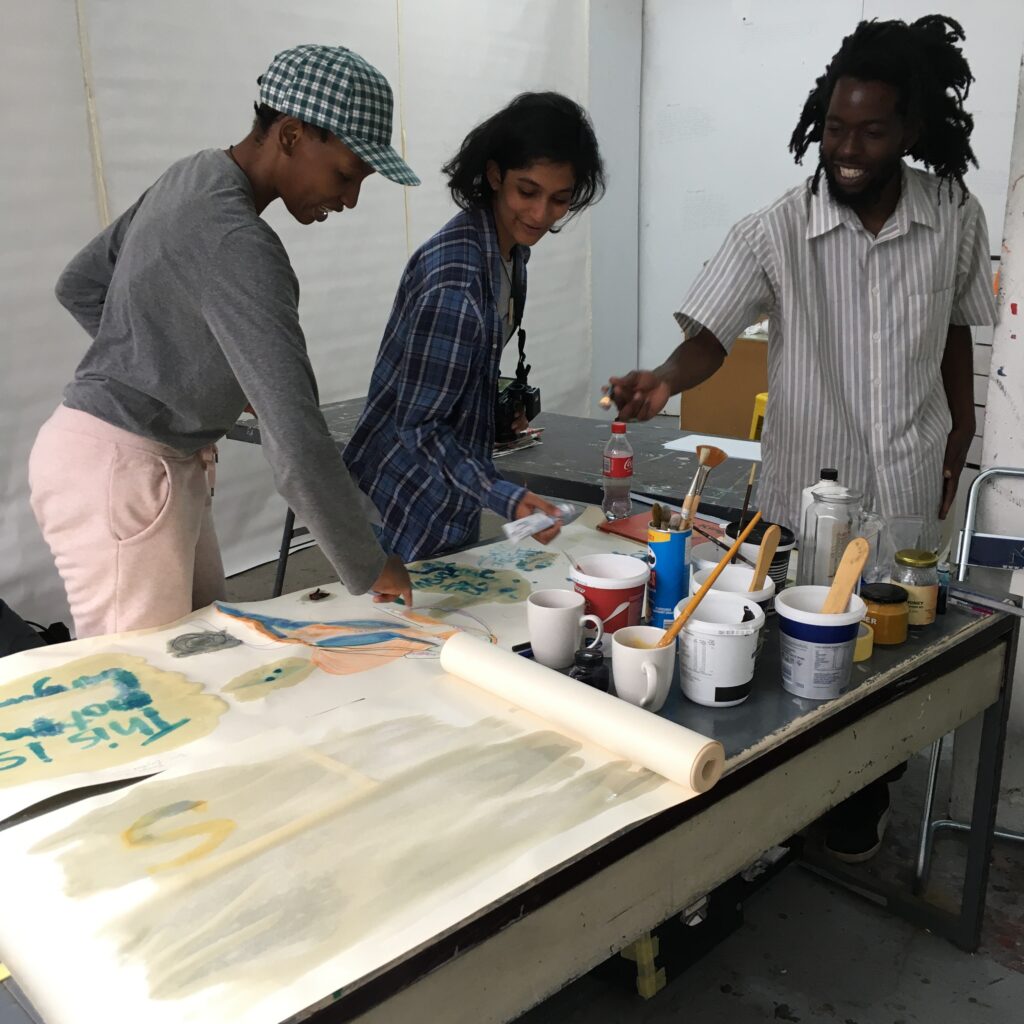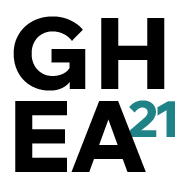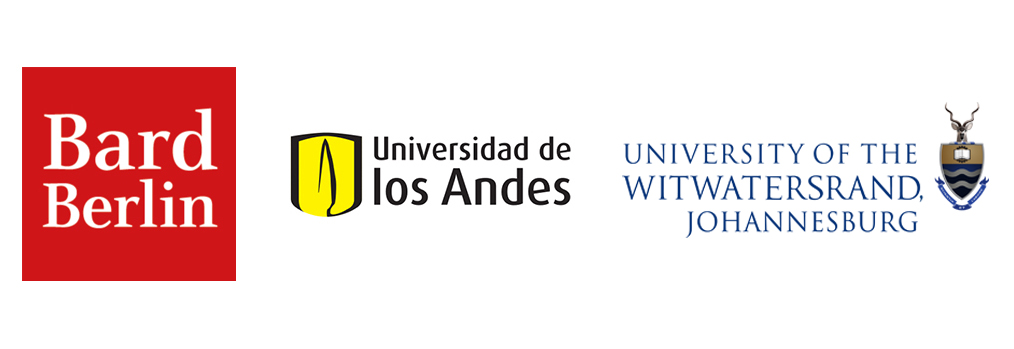Course Descriptions

Historical and Artistic Responses to 1945 and the Post-War Migration Regime
Bard College Berlin, Spring 2025
Course Coordinator: Marion Detjen
This cross-campus class, taught in collaboration with Universidad de los Andes (Bogotá, Colombia) and University of the Witwatersrand (Johannesburg, South Africa), explores the way research-based art-making generates new kinds of knowledge about migration, displacement, and exile. In Spring 2025 semester, the BCB class focused on 1945, the end of the Second World War 80 years ago, and its effects on and consequences for migration and movement globally. In the “Research” part of the class, students gained an overview of the relevant global historical events and the concept of the “migration regime” before delving into primary sources from three different regions. These included legal documents, pictures, historical film footage, and letters. They drew on historical methods used by history scholars to analyze such sources. Students then developed a topic for their individual projects on 1945 from a region of their choice, and research the original historical sources that they wanted to work with. In the “Creation” part of the class, students continued their research, working with their chosen subject matter to develop artworks that were presented collectively at the end of the semester – as zines, poems, collages, or other combinations of text and images that can be printed.
In three shared online sessions with the Bogotá and the Johannesburg groups, students learned about partner classes’ responses to migration and the arts, and discussed individual student projects with a global perspective. Projects from all three campuses were presented in public events in Berlin, Bogotá and Johannesburg, and on the Research-Creation website. Our closing event at BCB was a mixed faculty-student-artist conference on the significance of 1945 today that combines historical and artistic approaches.
Exhibition: Bard College Berlin 2025, We Threw Open the Doors
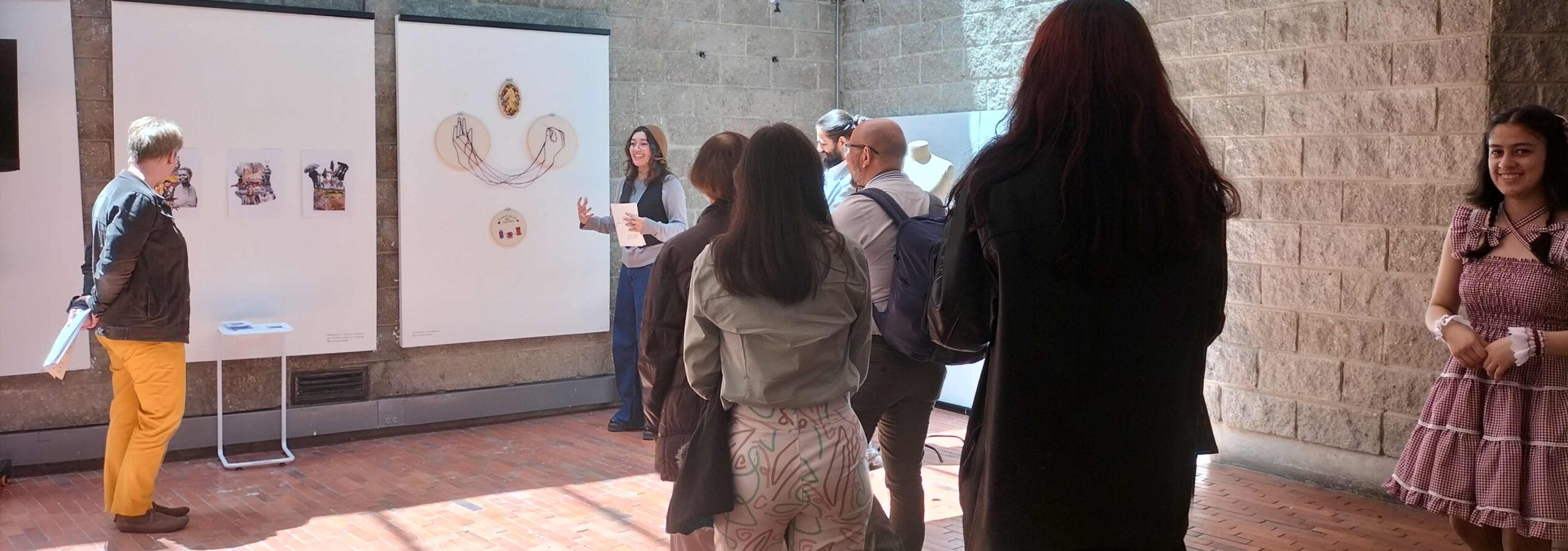
Conjunctures, Futures
and Affects
University of the Andes, Spring 2024
Instructor: Juan Ricardo Aparicio Cuervo
The threats of climate change, pandemics, increasing inflation on a global level, natural disasters, displacements and migrations together with the Ukranian and Palestinean invasions and other vectors of suffering in the contemporary world have put (one more time) the question of the future at the center of desires, frustrations and anxieties in the contemporary world. The relation between the past, the present and the future, so dear to the modernity narrative, has been put under suspicion under the imperative that nothing can change or that there is no possible future. But from other dimensions both intersubjective and affective, we can follow the continuation and production of life and the everyday in the middle of processes of precarization from registers and narratives coming both from social movements, literature and artistic practices. In parallel and in different countries, governmental and institutional practices have emerged in order to confront traumatic pasts and preparing the basis for the transition to a (supposed) better future. Truth Commisions, Museums of memory and other instances have been in charge of dealing with disruptive pasts and thinking on the posible reparations. From and within artistic practices and multiple narratives, other forms/approaches have been weaved to deal with traumatic pasts and imagining possible futures.
This said, in this shared course taught between three campuses located in countries that have gone through transitional moments to deal with the past and design new futures, we want to explore how Cultural Studies and certain narrative practices reflect, interrogate and intervene on the construction of the future and the present conjuncture. We combine the critical gaze with case studies, ethnographies, narratives and artistic practices that put in tension these problems and offer formidable and unending reserves of other possible maginations (speculations). In this way, our conjunctural analysis necessarily locates the imperial, colonial, postcolonial, racial, patriarchal and neoliberal formations and determinations of the present; but also, affects, desires, possibilities and the same everyday where subjects move in the world.
The three courses have similar objectives and perspectives, although they are not identical. They share bibliography, but they are contextualized through their problems and particularities. During the semester, we meet virtually at least three times and our meetings are in English. Students develop along the semester an intervention project that can take the form of blogs, fanzines, documentaries, sculptures, digital installations, etc. Each campus ends up with an exhibition of these individual projects. During the semester at the Universidad de los Andes, we have several sessions with the visual anthropologists and writer Catalina Cortés Severino, who also guides students through the process.
Exhibition: Universidad de los Andes 2024, Haceres, cuidados y futuros
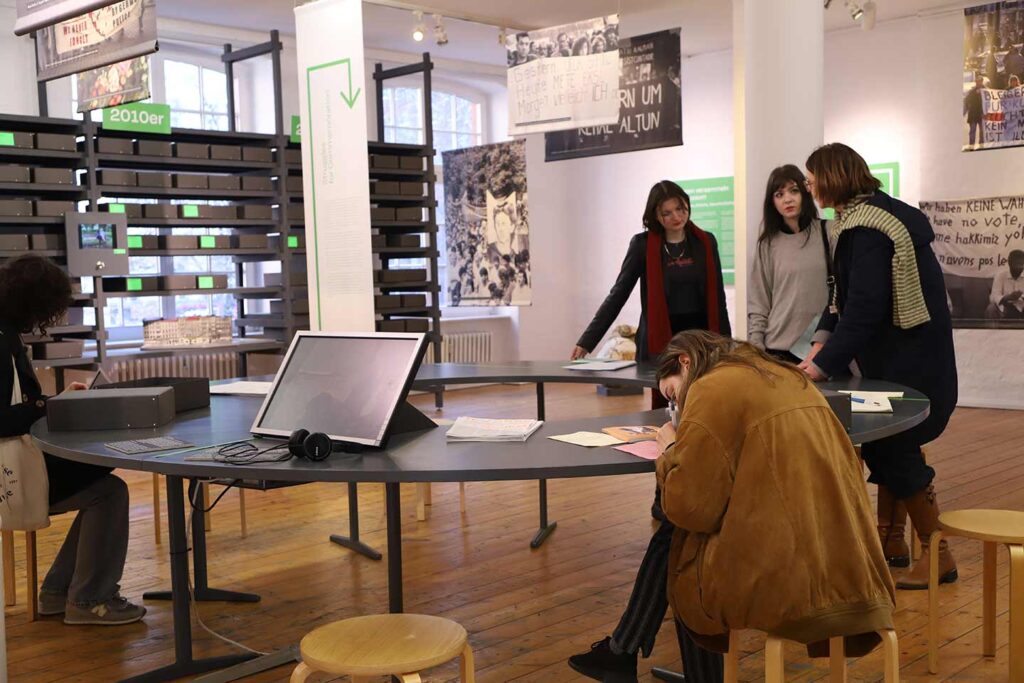
Developing Artistic Responses to Memories of Exile and Friendship in Dark Times
Bard College Berlin, Spring 2024
Course Coordinator: Marion Detjen
This cross-campus class, taught in collaboration with Universidad de los Andes (Bogotá, Colombia) and University of the Witwatersrand (Johannesburg, South Africa) explores the way research-based art-making generates new kinds of knowledge about exile, displacement, and diaspora. This semester, in view of the global crisis accelerated by the events in Israel/Palestine and the destruction of the public sphere, the BCB class focuses on friendship and memories of friendship in exile and “dark times”, as practiced and theorized by Hannah Arendt. In the “Research” part of the class we read and challenge her seminal texts on friendship as well as parts of her correspondences with friends and poetry that she referred to, and we discuss their political and aesthetical implications for our contemporary experience. Students develop a topic for their individual research, which has to be historically and theoretically informed but is free to make use, to reject or ignore Arendt’s concepts. In the shared online sessions with the Bogotá and the Johannesburg groups we learn about their responses to the “dark times”, to memory of exile, and the destruction of the public sphere, and discuss individual student projects with a global perspective.
In the “Creation” part of the course, during workshops and in individual sessions, young artists and BCB alums help students translate their research projects into artistic projects, in a medium of their choice. Projects from all three campuses are presented in public exhibitions in Berlin, Bogotá, and Johannesburg, and on the Research Creation website. The art production was supervised, and the exhibition curated by BCB faculty, Dorothea von Hantelmann.
Exhibition: Bard College Berlin 2024, Friendship in Dark Times
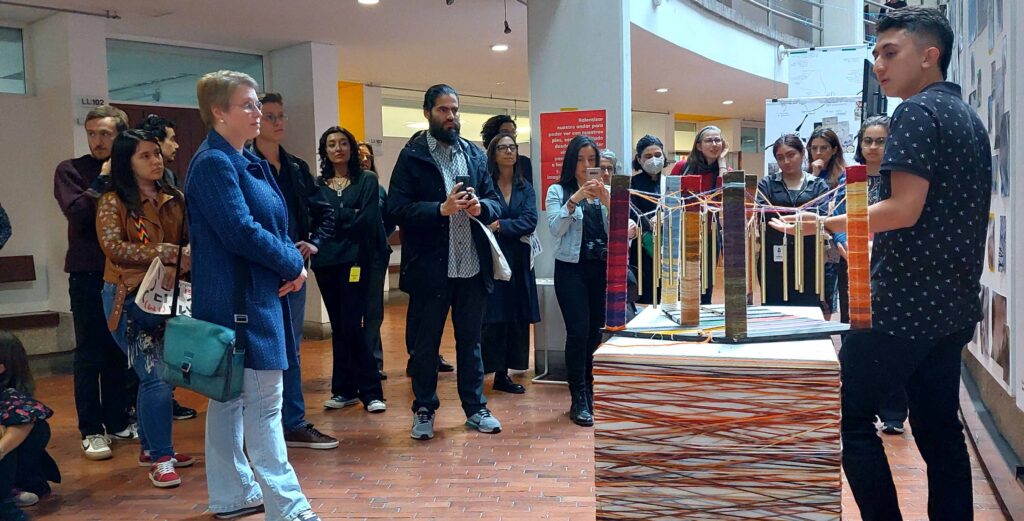
Conjunctures, Futures
and Affects
University of the Andes, Spring 2023
Instructor: Juan Ricardo Aparicio Cuervo
The threats of climate change, pandemics, increasing inflation on a global level, natural disasters, displacements and migrations and other vectors of suffering in the contemporary world have put (one more time) the question of the future in the center of desires, frustrations and anxieties in the contemporary world. The relation between the past, the present and the future, so dear to the modernity narrative, has been put under suspicion under the imperative that nothing can change or that their is no possible future. But from other dimensions both intersubjective and affective, we can follow the continuation and production of life and the everyday in the middle of processes of precarization from registers and narratives coming both from social movements, literature and artistic practices. In parallel and in different countries, governmental and institutional practices have emerged in order to confront traumatic pasts and preparing the basis for the transition to a (supposed) better future. Truth Commissions, Museums of memory and other instances have been in charge of dealing with disruptive pasts and thinking on the possible reparations. From and within artistic practices and multiple narratives, other forms/approaches have been weaved to deal with traumatic pasts and imagining possible futures.
This said, in this shared course taught between three campuses located in countries that have gone through transitional moments to deal with the past and design new futures, we want to explore how Cultural Studies and certain narrative practices reflect, interrogate and intervene on the construction of the future and the present conjuncture. We will combine the critical gaze with case studies, ethnographies, narratives and artistic practices that put in tensión these problems and offer formidable and unending reserves of other possible imaginations (speculations). In this way, our conjectural analysis will necessarily locate the imperial, colonial, postcolonial, racial, patriarchal and neoliberal formations and determinations of the present; but also, affects, desires, possibilities and the same everyday where subjects move in the world.
The three courses have similar objectives and perspectives, although they are not identical. They share bibliography, most notably, Silencing the Past by Michel Rolph-Trouillot, but are contextualized through their problems and particularities. During the semester, we will meet virtually three times and our meetings will be in English. Students will develop along the semester an intervention project that can take the form of blogs, fanzines, documentaries, sculptures, digital instalations, etc. Each campus will end up with an exhibition of these individual projects. During the semester at the Universidad de los Andes, we will have several sessions with the visual anthropologists and writer Catalina Cortés Severino, who will also guide students throughout the process.
Exhibition: Universidad de los Andes 2023, (Im)Possibilities
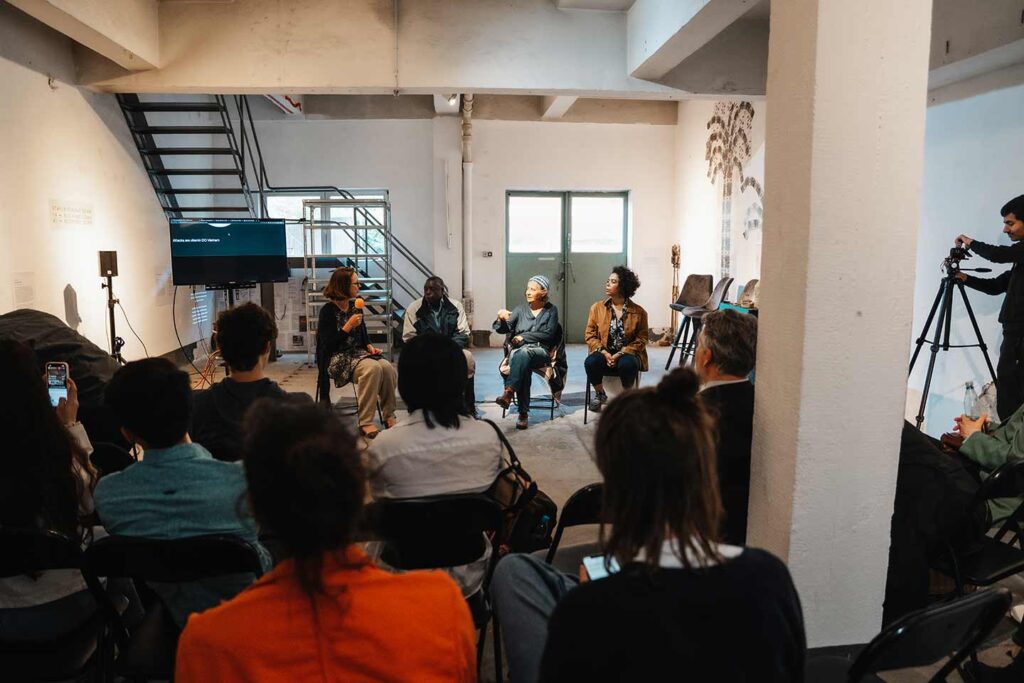
Developing Artistic Approaches to Post-1990 Truth and Reconciliation Commissions in Immigration Societies in Germany, in South Africa, and in Colombia
Bard College Berlin, Spring 2023
Instructor: Marion Detjen, Curator: Dorothea von Hantelmann
This cross-campus class, taught in collaboration with Universidad de los Andes (Bogotà, Colombia) and University of the Witwatersrand (Johannesburg, South Africa) explores the way research-based art-making generates new kinds of knowledge about movement, migration and displacement as urgent global challenges. This semester, the „research“ dimension focuses on the question of how, in post-conflict societies after 1990, Truth and Reconciliation Commissions have failed or succeeded, and how they dealt with migration and racism in a globalized world, while they themselves were still attached to the nation state principle.
The class at BCB will work specifically on the German truth commissions in the 1990s, set up by the German parliament to inquire the consequences of the GDR dictatorship that had just been overthrown, while there were waves of racist attacks across the country. In the shared sessions with the Bogotá and the Johannesburg groups we will learn about Colombian and South-African experiences with Truth and Reconciliation Commissions, listen to lectures and artist talks, and discuss individual student projects with a global perspective.
In the “creation” part of the course, a team of young artists and BCB alums (Lena Kocutar, Victoria Martínez, Dachil Sado, and Tamar Maare) will, during a weekend long workshop in March and in individual sessions, help students translate their research projects into artistic projects, in a medium of their choice. Projects from all three campuses will be presented in public exhibitions in Berlin, Bogotá and Johannesburg, and on the Research Creation website. The art production will be supervised, and the exhibition will be curated by BCB Dorothea von Hantelmann.
Exhibition: Bard College Berlin 2023, Under Currents Past
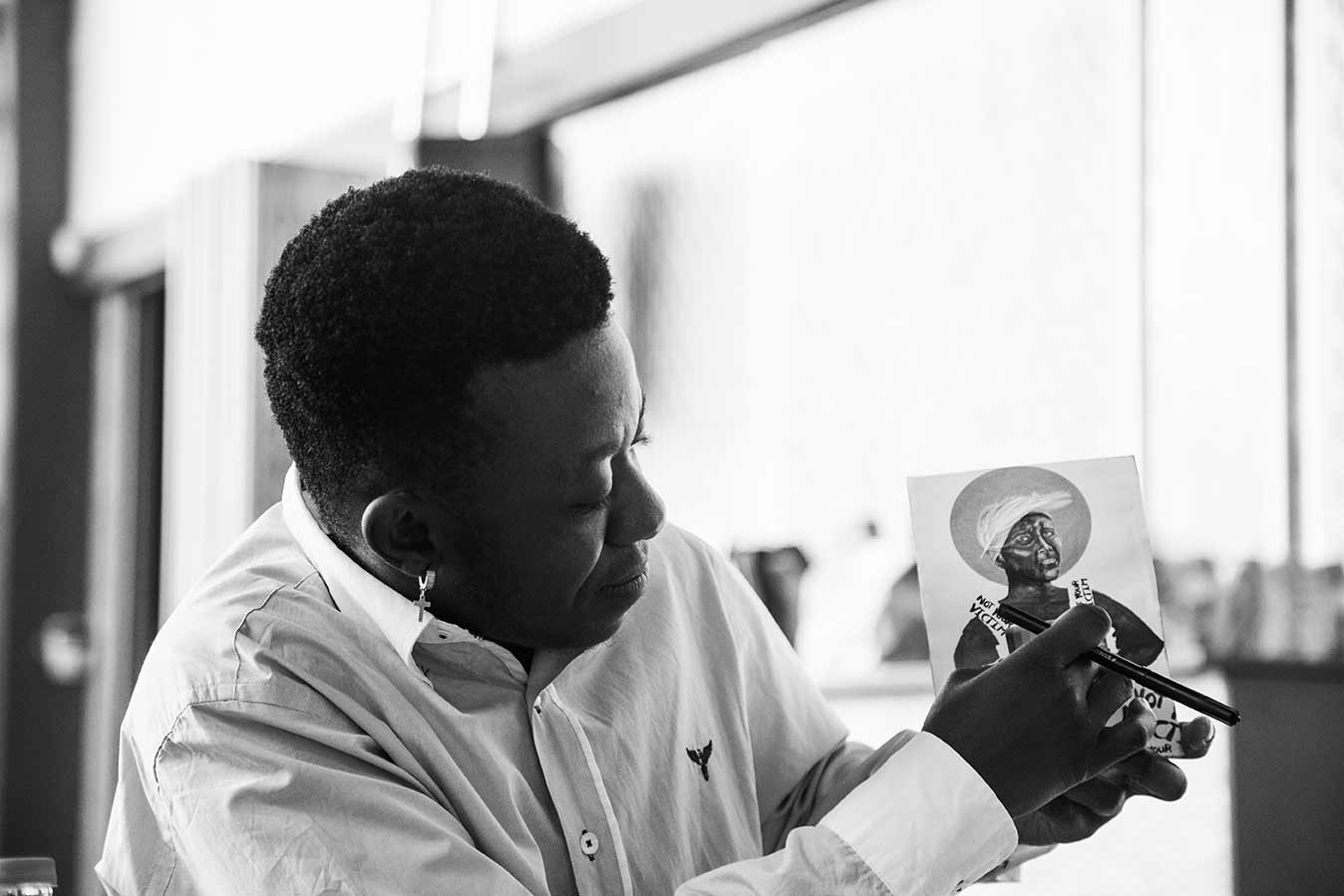
Forced Migration
and Art
University of Witwatersrand, School of Arts, Spring 2022
Course Coordinator: Nontobeko Ntombela
Invited artists and academics: Ayrson Heráclito, Bernard-Akoi Jackson, Brett Pyper, Clarissa Diniz, Duduzile Ndlovu, Greer Valley, Juan Carlos Orrantia, Nashilongweshipwe Mushaandja, Nicola Cloete, Nolan Oswald Dennis, Noor Nieftagodien, Pamela Sunstrum, Sinethemba Twalo
Artistic Practices and Migration is a cross-campus course taught in collaboration with Universidad de los Andes (Bogotá, Colombia), Bard College Berlin (Berlin, Germany) and University of the Witwatersrand (Johannesburg, South Africa). The course explores the way research-based art-making generates new kinds of knowledge about migration and displacement as urgent global challenges. Building on a Research-Creation approach to teaching migration history in dialogue with the arts, students develop individual or collaborative open-media artistic projects relating to the (im-)materialities that speak to migration.
Thematically, the course revolves around the bureaucracies that were created to curb and control migration and to react to asylum claims of those made stateless. They mirror a fundamental dilemma in all attempts to find responses to forced migration, throughout the 20th and 21st Century: On the one hand, nation-states and the international community based on nation-states have forged institutions — legal provisions and procedures, agencies, NGOs, etc., — to mitigate, to alleviate, to control and to hedge, even to “solve” the humanitarian, social and political consequences of forced migration. On the other hand, these institutions never intended to address the political causes that produced and to this day produce forced migration in the first place. Not getting at the roots of the underlying political and social problems, the institutions failed to keep the promise that every displaced, stateless person would eventually get on a road to state-citizenship, through integration, repatriation or resettlement. Instead, national and international policies and administrations have been focusing predominantly on combating migration as such, a futile endeavour that leaves a trail of bureaucratic failure in its wake, the Johannesburg course particularly focuses on how artists have observed the way in which different communities have navigated the limitations and possibilities of migration. Centering artistic practices as a starting point, the “research” dimension of the course will address the materialities of increasingly digitalised migration regimes.
We will read Sara Ahmed, Ayi Kwei Armah, Stuart Hall and Anna Laura Stoler for theoretical grounding, and share lectures and discussion sessions with our partner classes in Bogotá and in Berlin. In the “creation” dimension of the course, research-based artistic projects will be produced.
Exhibition: Witwatersrand School of the Arts 2022, Rendered Passages
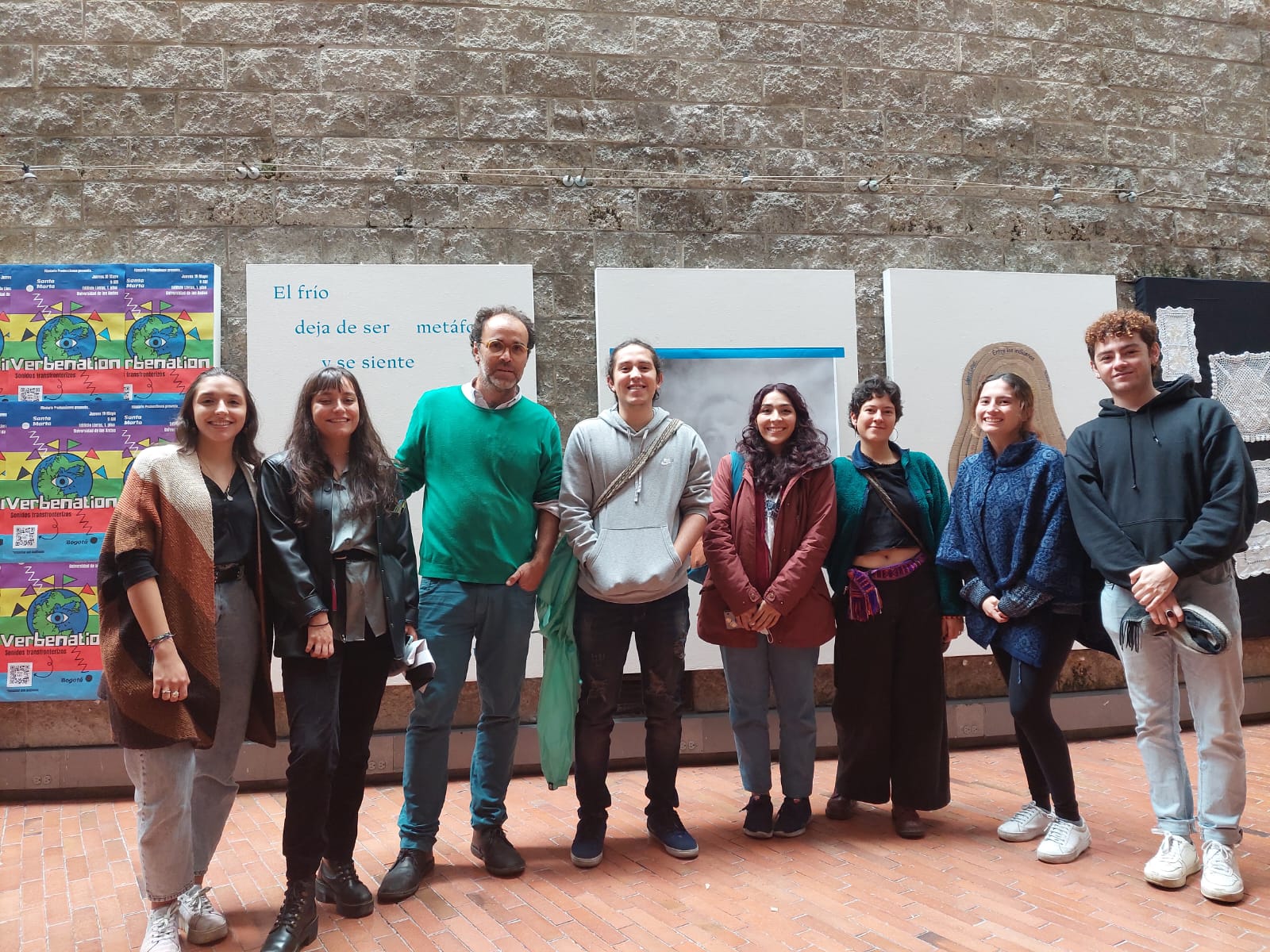
Migration and Ruins
University of the Andes, Spring 2022
Instructor: Juan Ricardo Aparicio Cuervo
This shared course between three campuses (Universidad de los Andes-Bogotá, Bard College-Berlín, Germany, Universidad de Witwatersrand-Johannesburgo, South Africa) explores the characteristics, problems and challenges of the force migration field from a Cultural Studies perspective and its analytic lense for understanding this problem within the relation of culture and power and its inherent contradictions. It underscores the relation between the ruin and migration in order to understand how the forced displacement of people inside and outside the Nation-State illuminate many of the fractures and specters that correspond to the history of the present. Thus, ruins and their exploration through the research creation and the artistic practice become the central dimension that would allow us to (1) understand the heterogeneity of the migration experiences and their singularity (2) follow its dense materialities and failure of the discursive regimes and dispositifs displayed by a humanitarian bureaucracy to protect refugees, IDPs, asylum seekers, migrants, etc. And lastly, (3) because it allows us to link migration and the ruins both to the contradictory histories of a coloniality of power, of modes of production, environmental crisis, violent regimes of accumulation by disposession and historical violences; but also, in the inscription of these wounds in the body and the terrain of subjectivities, memories and affects. We will combine the critical analysis with case studies ethnographies and artistic practices that will help us to acknowledge the relevance of the concept of the ruin for approaching the everyday register of migration. Key readings include Stuart Hall, Achile Mbembe, Gloria Anzaldua, Laura Stoler, Gastón Gordillo and Sara Ahmed. As a course that combines the research-creation with the artistic practice, students will develop a project to dwell into the unsaid, to the affective, to the silences and desires.
Exhibition: Universidad de los Andes 2022, La Frontera y el Telar
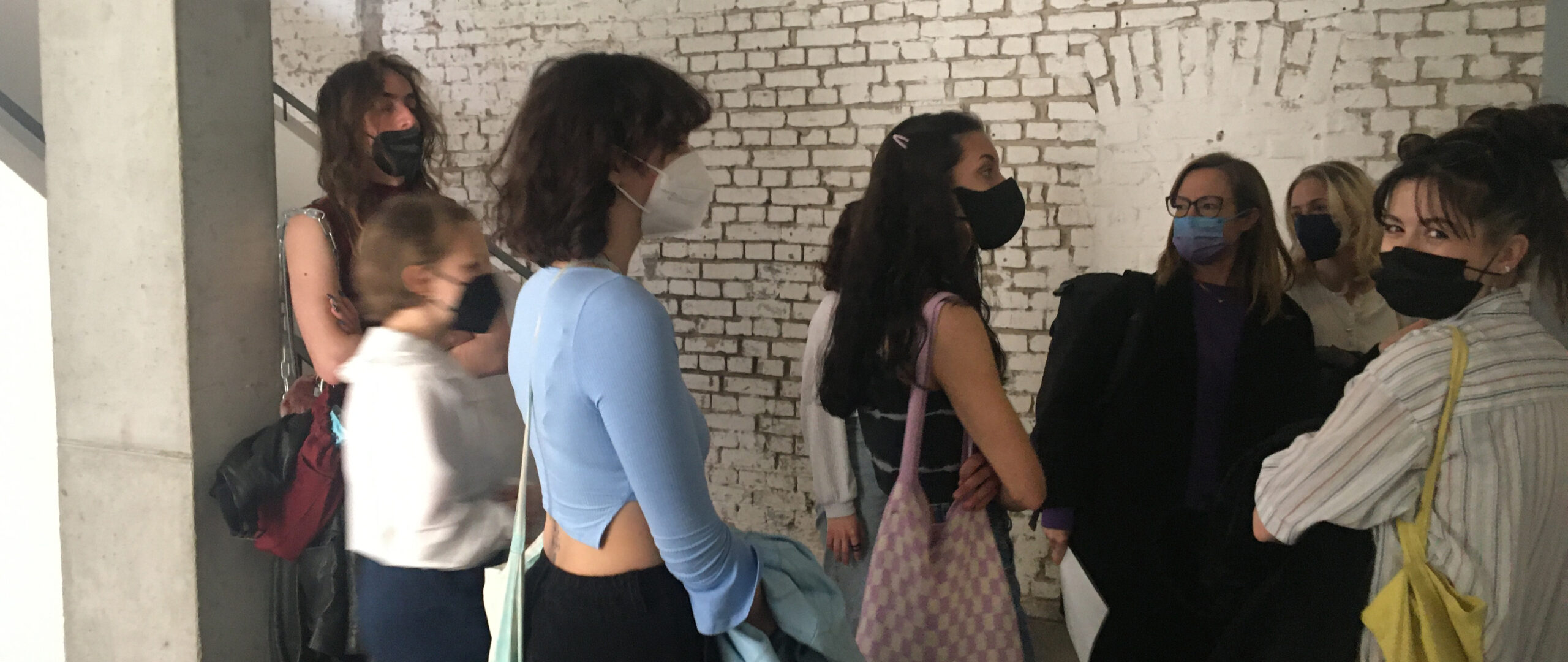
(Im-)Materialities of 20th/21st Century “Refugee Protection”
Bard College Berlin, Spring 2022
Instructors: Marion Detjen, Dorothea von Hantelmann
This cross-campus class, taught in collaboration with Universidad de los Andes (Bogotá, Colombia) and University of the Witwatersrand (Johannesburg, South Africa), explores the way research-based art-making generates new kinds of knowledge about forced migration and displacement as urgent global challenges. Building on a Research-Creation approach to teaching migration history in dialogue with the arts, students will develop individual or collaborative open-media artistic projects relating to the (im-)materialities of the “modern refugee”.
Thematically, the course revolves around the bureaucracies that were created to curb and control migration and to react to asylum claims of those made stateless. They mirror a fundamental dilemma in all attempts to find responses to forced migration, throughout the 20th and 21st Century: On the one hand, nation-states and the international community based on nation-states have forged institutions – legal provisions and procedures, agencies, NGOs etc. – to mitigate, to alleviate, to control and to hedge, even to “solve” the humanitarian, social and political consequences of forced migration. On the other hand, these institutions never intended to address the political causes that produced and to this day produce forced migration in the first place. Not getting at the roots of the underlying political and social problems, the institutions failed to keep the promise that every displaced, stateless person would eventually get on a road to state-citizenship, through integration, repatriation or resettlement. Instead, national and international policies and administrations have been focussing predominantly on combating migration as such, a futile endeavor that leaves a trail of bureaucratic failure in its wake.
The „research“ dimension of the course will enquire the materialities of these trails – lists, papers, forms, stamps, technological devices of all kinds for surveillance and control, and the physical traces of migrants handling of it -, as well as address the immaterialities of increasingly digitized migration regimes. We will read Stuart Hall, Sara Ahmed and Ann Laura Stoler for theoretical grounding, and share lectures and discussion sessions with our partner classes in Bogotá and in Johannesburg. In the „creation“ dimension of the course, research-based artistic projects will be produced. At the end of the course, these projects will be presented in public exhibitions/events in the three cities (Berlin, Bogota and Johannesburg) and on a common website.
Exhibition: Bard College Berlin 2022, The Diasporic Pitch
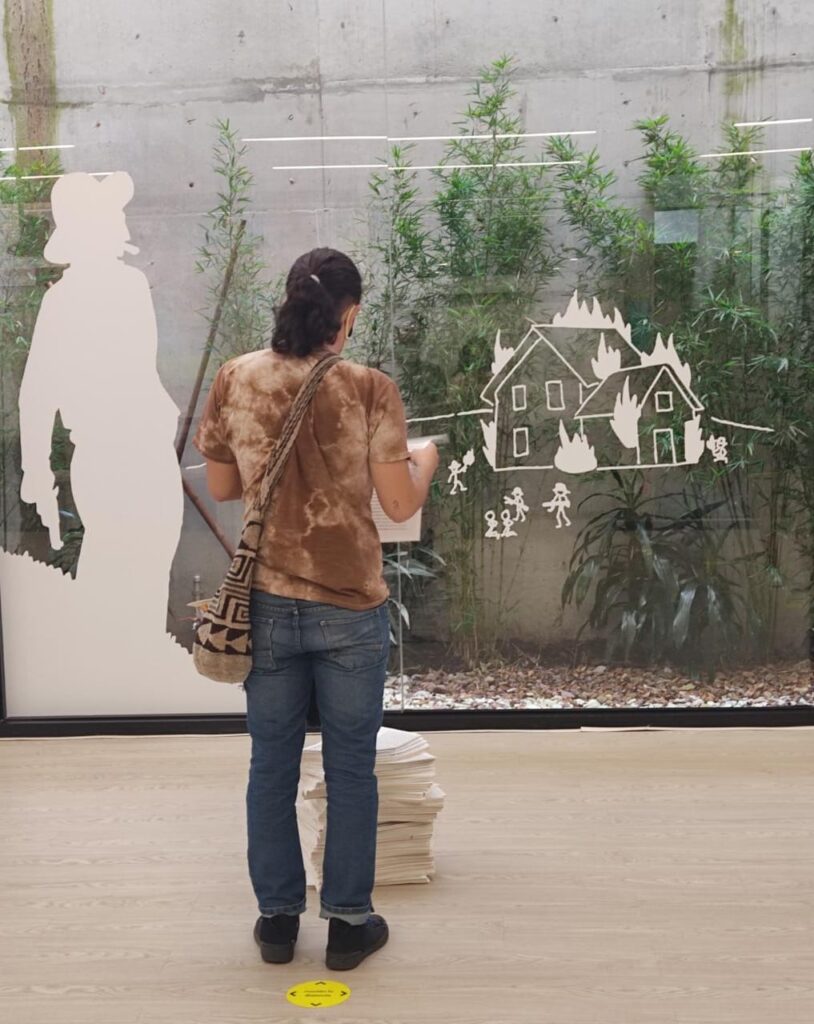
Refugees, Displaced and Expelled: At the Mercy of the Institutions
University of the Andes, Spring 2021
Instructor: Juan Ricardo Aparicio Cuervo
This course explores the contours, problems and challenges of the field of Transcultural Migrations from a cultural studies perspective interested in framing this problem through the analytic lenses of the relation of culture and power. The course interrogates from an historical perspective how the movement of people within and outside international borders became a problem for the same notion of the Westphalian nation-state and the definition of a right-bearing citizen protected by the Nation-State at the end of the XIX century and the beginning of the XX century. We will explore how this phenomenon became problematized by new legal categories and the deployment of a humanitarian response in order to take care of those who were aspiring for `the right to have rights´ and who had been expelled from the same idea of “humanity”. We will look both at the emergence of the category of the refugee and the internally displaced persons in order to understand the different contexts that gave these regimes the particularities they had. We will combine this critical analysis with case-studies, ethnographies and critical artistic practices that put in tension these regimes with the experiences and the everyday life, with the histories of political mobilizations and organization of both refugees and internally displaced persons. We will study how the movement of people and the processes of reterritorialization and deterritorialization have been crucial for the contemporary regimes of capital accumulation that have to be understood as imperial, colonial and postcolonial, racial, patriarchal and neoliberal. In one word, as synonymous of what Saskia Sassen calls as the brutal expulsions of the contemporary global economy.
Exhibition: Universidad de los Andes 2021, Traspasos
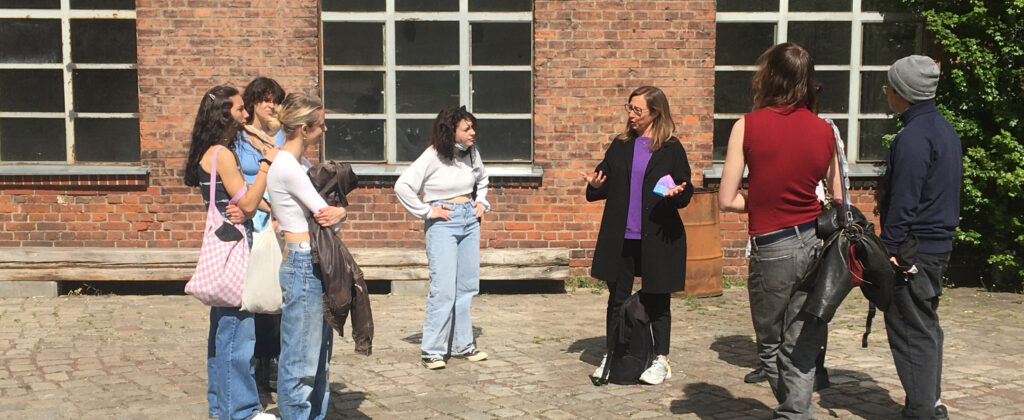
Artistic Approaches to Forced Migration and the Dilemma of the Nation State
Bard College Berlin, Spring 2021
Instructors: Marion Detjen, Dorothea von Hantelmann
This cross-campus class, taught in collaboration with Universidad de los Andes (Bogotà, Colombia) explores the way research-based art-making generates new kinds of knowledge about migration and displacement as urgent global challenges. Building on a Research-Creation approach to teaching migration history in dialogue with the visual arts, students will develop individual or collaborative open-media artistic projects relating to the discourses of the “modern refugee” and their impacts on the lives of forced migrants.
Thematically, the course revolves around a dilemma that seems fundamental in all attempts to find humanitarian and human rights related responses to forced migration, throughout the 20th and 21st Century: On the one hand, nation-states, and the international community based on nation-states, forged institutions – legal provisions and procedures, agencies, NGOs etc. – to mitigate, to alleviate, to control and to hedge, even to “solve” the humanitarian, social and civic consequences of forced migration. On the other hand, these institutions never intended to address the political causes that produced and to this day produce forced migration in the first place. Not getting at the roots of the underlying political and social problems, the institutions failed to keep the promise that every displaced, stateless person would eventually get on a road to state-citizenship, through integration, repatriation or resettlement. The „research“ dimension of the course will address this dilemma from a European perspective with readings, lectures and discussion sessions, in close exchange with the course taught at the Universidad de los Andes, that approaches the dilemma from a Latin-American perspective. Guest lectures from the Wits Institute for Social and Economic Research/South Africa will add an African perspective, as much as new thinking about migration and mobility. In the „creation“ dimension of the course research-based artistic projects will be produced that will be presented in a public (online) exhibition at the end of the semester.
Exhibition: Bard College Berlin 2021, Relational Creatures
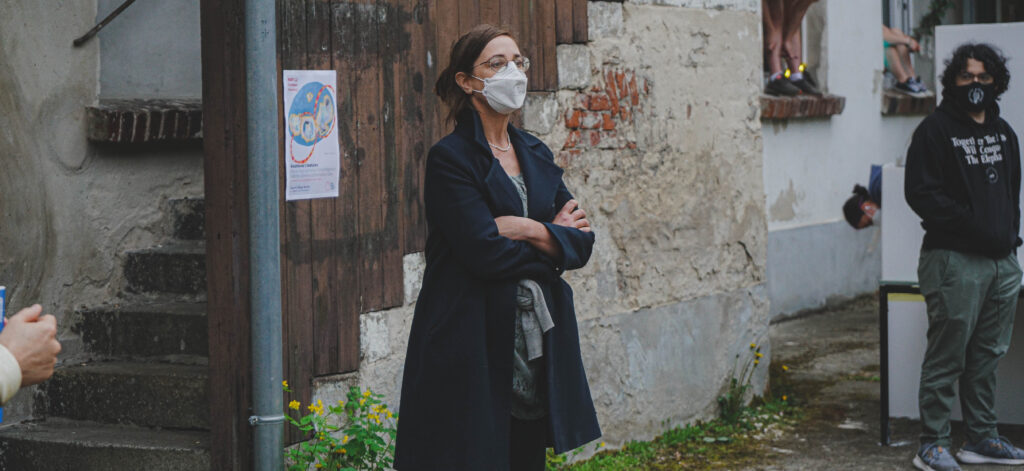
Artistic Approaches to German History, Memory of Forced Migration and the War
Bard College Berlin, Spring 2020
Instructors: Marion Detjen, Dorothea von Hantelmann
May 2020 will see the commemoration of the 75th anniversary of the end of the Second World War in Europe. While Germany’s unconditional surrender on May 8 1945 brought a halt to the mass extermination and warfare that had killed between 40 and 50 million people, overwhelmingly large movements of forced migration continued well into the post-war period and eventually led to the “making of the modern refugee“ (Peter Gatrell), the international refugee regime of our day. Flight and expulsion have since then attained an integral place in collective memory in Germany, being represented in museums and memorials, as well as family verbal and artifactual archives. These memories were reactivated in the “summer of migration“ in 2015, when German society welcomed a large number of migrants with surprising openness and willingness to help, a public mood that was regarded by some as unsustainable. Through methods of research-creation this course examines the connections between the history and memory of wartime and postwar forced migration in Germany, and the history and memory of contemporary forced migration from the Middle East and elsewhere. At museums and memorial sites we experience sources from the German post-war period (films, literature, music), asking what assumptions they convey, and what stories they tell about German and non-German refugees, expellees and displaced persons after the war. Participants then develop their own individual projects, artistic in spirit and relating historical sources to today’s phenomena of forced migration, finding parallels, contradictions, and fruitful references. These projects shall in the second half of the semester be visualised, performed, translated into “art,” experimenting with new ideas and new forms to discover the underlying relationships between the histories and memories of forced migration, of war and revolution, that compete with each other and/or complement each other in today’s Germany. The resulting projects will be exhibited to a broader audience in a public event at the Centre Marc Bloch.
Exhibition: Bard College Berlin, 2020, Beyond the Modern Refugee. The exhibition and the public event had to be cancelled due to Covid19; at the time we showed the students’ works in an online showcase.
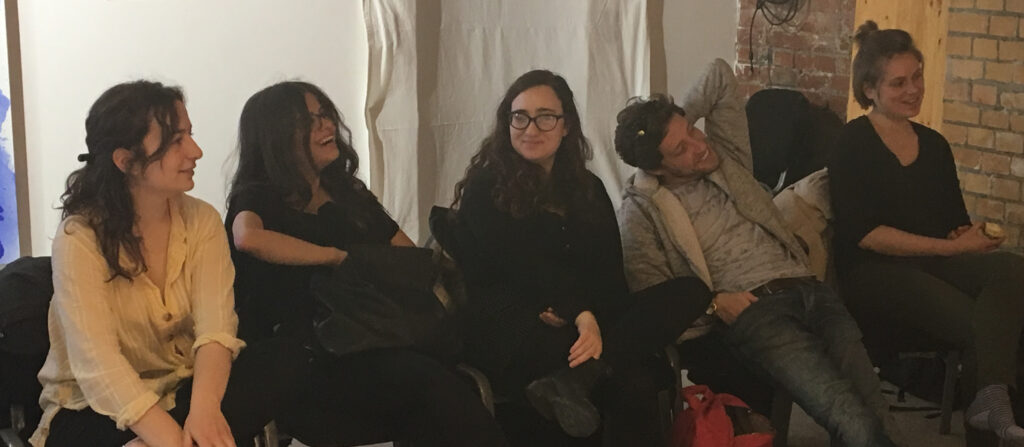
(IL)LEGAL: New Artistic and Curatorial Approaches to the History of Migration in Germany
Bard College Berlin, Spring 2019
Instructors: Marion Detjen, Dorothea von Hantelmann
This class is a continuation of the Fall 2018 seminar “„Illegal“ and „legal“ migration in Germany since World War II”, but can also be taken by newcomers. It takes Abdelmalek Sayad’s concept of „unruly thinking“ („to follow the migrant is to transgress all borders“) onto the field of the history of juridification of migration in Germany, by developing and curating individual artistic projects on questions of legality and illegality of migration. On the basis of interdisciplinary research, each student will create an artistic project, in a medium of choice (film, music, poetry/text, performance, painting, collage, etc.). The production of the individual projects will be accompanied by mentoring sessions with invited contemporary artists. Deploying artistic modes of expression to advance and enhance our previously collected research knowledge should help us to accommodate and to make productive the ambivalences and contingencies of the illegalisation and criminalisation processes connected with unwanted migration. In the first half of the semester we will work on the concepts and artistic potentials of the projects, meet with artists, go to exhibitions and discuss formats and modalities of presentation for the projects. The second half will be spent with the realisation and completion of the art works and with exhibiting/presenting them to the public.
Exhibition: Bard College Berlin, 2019, The Skin of the Law
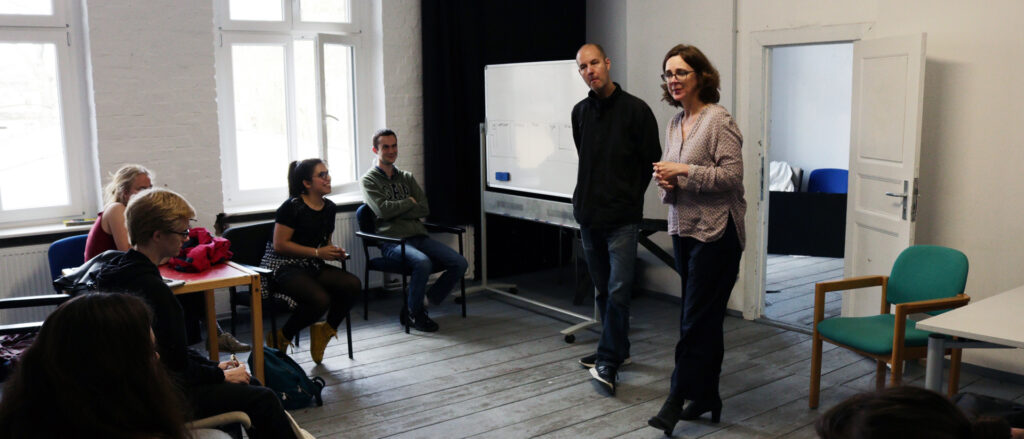
New Approaches to the History of Forced Migration in Germany
Bard College Berlin, Spring 2018
Instructor: Marion Detjen, John von Bergen
This class is a continuation of the Fall seminar “History and Memory: Forced Migration in 20th and 21st Century Germany”. It combines artistic and conceptual approaches, taught jointly by John von Bergen and Marion Detjen. We will start with an introduction to contemporary art works based on forced migration history and memory, as well as other examples of artworks that may offer inspiration for project development . Then we will go through the concept and the experimental possibilities of “research-creation”, an approach that has been developed in social sciences and humanities to introduce creative processes and artistic practices as an integral part of research. The largest part of the class will be spent working on individual projects to visualize, melodize, spatialize or verbalize previously collected knowledge and experience, seeking to advance and enhance our knowledge with new, artistic means. The students should decide at the beginning of the class whether they wish to pursue “creation-as-research”, i.e. work on an artistic project themselves, or whether they prefer to do “research-from-creation”, i.e. analyze and interpret the works of their fellow students in their formation process. The medium of choice should be established as early as possible for logistical reasons. At the end we will produce an exhibition to present our works and to put them forward for public discussion.
Exhibition: Bard College Berlin, 2018, I am the Ghost
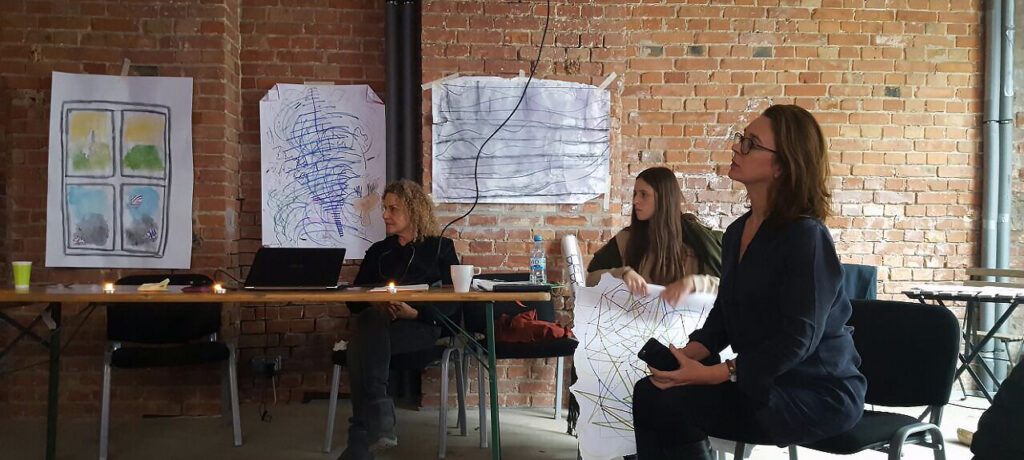
Legal and Illegal Migration in Germany Since World War II
Bard College Berlin, 2018
Instructor: Marion Detjen
This course is an introduction to post-War migration history in Germany, with a special focus on “legal” and “illegal” migration and the discourses, policies and concepts of legality that shaped this distinction. In the first half of the term, we will seek to understand why Germany finds it so difficult to conceive of itself as an immigration country. We also examine what kind of migration regimes the Federal Republic of Germany and the German Democratic Republic developed after the Second World War. As we will see, these regimes emerged within the framework of the division and subsequent unification of the two German states, and within a wider European and global context. What means of entry and exit were allowed in the period under examination? What kinds of status were accorded to migrants and refugees, and how did these alter under pressure from changing economic and political exigencies? In the second half of the course we will explore how the various parties involved dealt with the restrictions and the loopholes of the law, often combining “legal” with “illegal” means. We will compare the phenomenon of Fluchthelfer (“escape helpers,” dubbed Menschenhändler by the East German government) with people-smuggling at the European borders today, and we will discuss the connections between the fight against “organized immigration crime” and current negotiations for resettlement programs. The course offers insight into a broad range of methods of migration research and draws on both published and unpublished sources. We will interview experts on border crossings, work on a case study, and make excursions to the Berlin Wall Museum at Bernauer Straße and the NGO Flüchtlingspaten Syrien e.V. At the end of the term, you will be asked to present your own project in a visualised form, using presentation software like Prezi, or film, or collage. Your project can if you wish be continued next term in a “research-creation” class as a more elaborate work of art.
Exhibition: Bard College Berlin
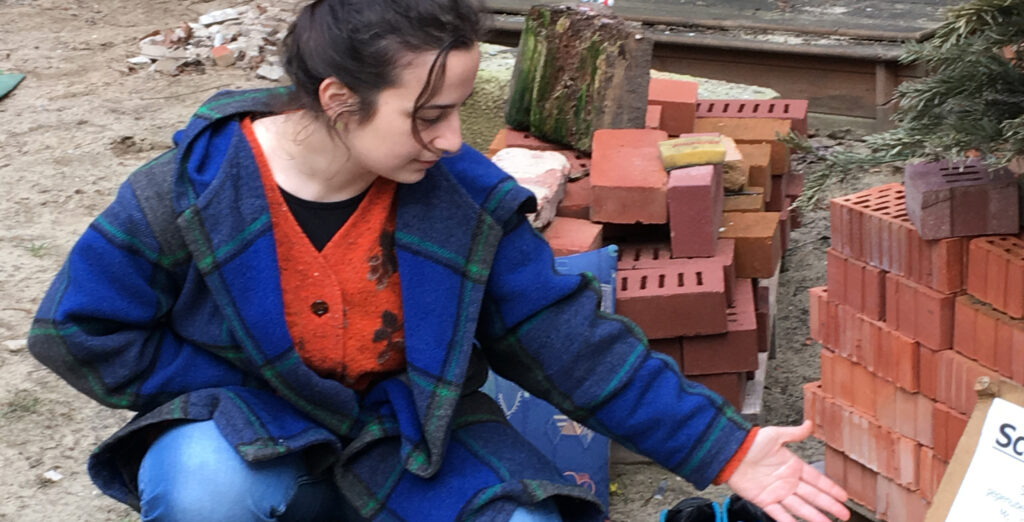
History and Memory: Forced Migration from Nineteenth to Twenty-First-Century Germany
Bard College Berlin, Fall 2017
Instructor: Marion Detjen
This course is an introduction to the history of forced migration in Germany from WWI to the present day, in the light of recent experiences in Germany related to the ordeals and the designation of those who seek “refugee” status. The course proceeds from the fundamental assumption that the category of the “refugee” is a social construction, negotiated every day under specific conditions of power and hierarchy and tied closely to the memories of those who take part in this negotiation. Germany’s history has always been permeated by violent movements of forced migration. Memories of escape and expulsion have left deep marks in the culture of the country. We will acquire the historical knowledge and methodology needed to understand some of the conditions of these negotiation processes throughout the 20th century until today, and we will then seek, analyse and interpret the memory traces in German and non-German literature. Most importantly, our inquiry will be steered by the questions that the experiences of contemporary “refugeedom” in Germany impose on us. The class will include non-enrolled students and host guests with a personal background of forced migration. We will also make excursions to places where cultural memory is “institutionalized” to a greater or lesser degree.
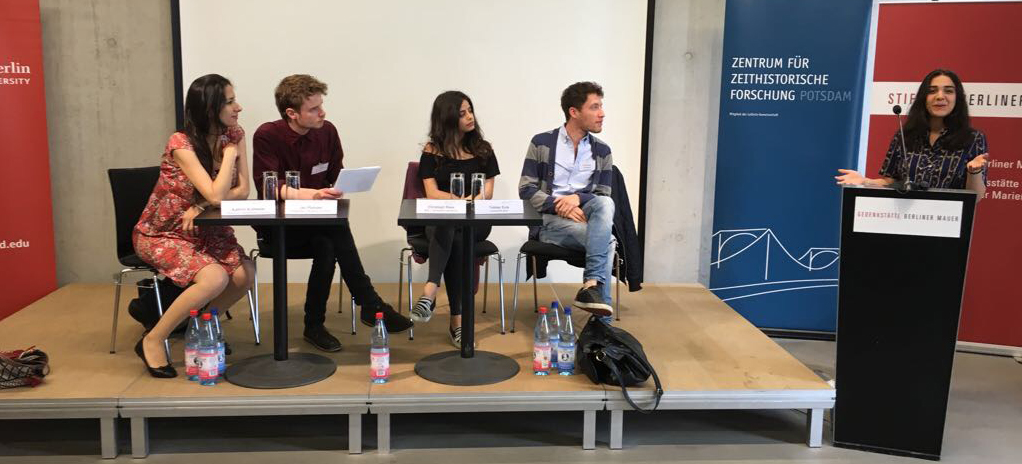
New approaches to Contemporary Migration History in Germany
Bard College Berlin, Spring 2017
Instructor: Marion Detjen
This course is a continuation of the Fall seminar course In Search of a History: Migration in Germany from World War II to the Present, focusing on students’ individual projects. These projects seek to give visual, verbal, spatial, musical and general aesthetic and sensory expression to previously collected knowledge of migration history and experience. The projects need not have the ambition of entering the realm or category of “art”: we consider them “notations,” recording our perceptions and thoughts in the modes of articulation that suit us best. First we will review the historical data, tools, and concepts of migration history that allow us to achieve an analytical distance and conceptualize as well as historicize our material. Subsequently, we will work on a collective visualization project. The major part of the course is dedicated to developing and completing the individual projects and findings solutions for exhibiting them. We will cooperate with a number of renowned artists who will add creative, formal, and practical input and advice to our historical and linguistic framework. The course will be taught as a block seminar on three weekends in February, March and April at “BOX Freiraum” in Boxhagener Straße, Neukölln, where we will also be able to exhibit the projects in May. The exhibition is part of an international conference on migration history planned for May 11 and 12. One panel has been reserved for us to present the projects and to reflect on the relations between migration, research, education and creativity that we will have uncovered through our work. Due to its special character the course will be restricted to participation by 15 students. Those interested are asked to apply with a project that should have a clear topic and already show some progress in research and in formulation. The project should have a transnational dimension, crossing at least one national border, and take into account migrant and/or post-migrant experiences. Also, the medium of the chosen “notation” (whether it be film, photography, music, drawing or painting etc.) has to be referenced in the application, so that we can arrange to involve artists competent in the practice cited.
Exhibitions: Bard College Berlin + ]a[, 2017, Tread Softly
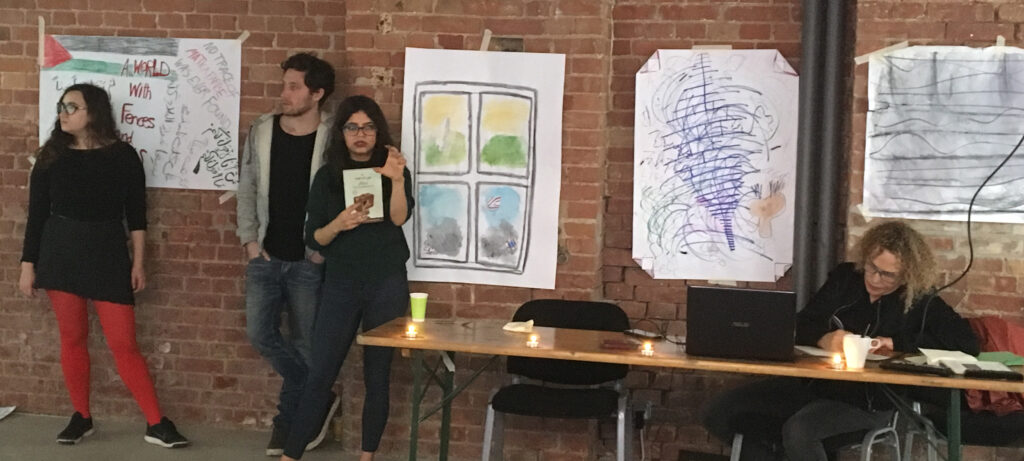
In Search of a History: Migration in Germany from World War II to the Present
Bard College Berlin, Fall 2016
Instructor: Marion Detjen
This course is an introduction to post-war migration history in Germany with a special focus on Berlin, the city that has been a crossing point for migration movements ever since the settlement of the Huguenot Réfugiés in late 17th century, and is now a main center for dealing with issues arising from the so-called “refugee crisis“. In spite of constant migration, German academic historiography has until recently widely neglected this history. We will seek to understand why Germany found it so difficult to conceive of itself as an immigration country and what kind of migration regimes it developed after the Second World War, under the conditions of German separation and reunification and in a European and global context. This will lead us to ask broader questions about how history is being written and what aims and interests it serves. How do personal and collective experience shape historical knowledge, and what is the relationship between politics and history? How many narratives can be formed out of one basic chronology, and how do we find the appropriate categories for analyzing and interpreting our source material? The sources are not restricted to written documents, as we will use the city of Berlin with its rich landscape of memorials, archives and museums as our material, hearing the testimony of contemporary witnesses who wrote German migration history as outsiders. At the end of the term, students will be asked to elaborate their own perspectives on migration history, using the general tools that historical methodology provides but finding the personal modes of expression that suit them best.
